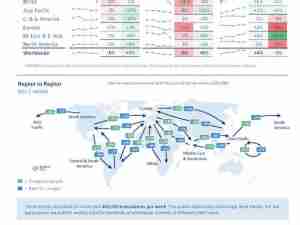Bombardier Inc., its biggest aircraft program now controlled by Airbus SE, is sketching out a future based on increased rail-equipment orders and a rebounding market for business jets.
With orders piling in for trains, private planes and regional jets, Bombardier is positioned to “sustain cash generation well into the future,” Chief Financial Officer John Di Bert said Thursday on a conference call with analysts. The company is also getting a boost from sales of aircraft parts.
Canada’s largest aerospace company is entering the second half of a five-year turnaround plan that Chief Executive Officer Alain Bellemare designed to increase profit and reduce debt. Having cut jobs, bolstered liquidity and teamed up with Airbus on the C Series jetliner, Bellemare is now working to push Bombardier’s next big revenue generator, the Global 7500 business jet, into service later this year.
“We are reaching an important inflection point, where our heavy investment cycle is winding down, and our new programs are ramping up,” Bellemare said on the call. “The focus is now on increasing production capacity, improving operational efficiency and accelerating growth.”
Bombardier’s widely traded Class B shares jumped 4.8 percent to C$4.98 at 11:52 a.m. in Toronto after advancing as much as 5.9 percent for the biggest intraday gain in six weeks. The stock’s 57 percent gain this year through Wednesday was the fourth-biggest advance on Canada’s benchmark S&P/TSX Composite Index.
In the second quarter, Bombardier eked out a surprise profit of 3 cents a share, while analysts had predicted a loss of a cent. Sales rose 2.8 percent to $4.26 billion, surpassing the average expectation of $4.22 billion. The Montreal-based company also reaffirmed its sales, earnings and cash-flow targets for 2018 and 2020 in a statement.
‘Interesting Things’
Bombardier’s capital expenses exceeded its operating cash flow by about $370 million in the three months ending June 30. The negative free cash flow was less than the $546 million average of analysts’ estimates compiled by Bloomberg. Including the one-time proceeds from a Toronto real estate sale in June, Bombardier generated free cash flow of $232 million for the period.
The latest quarterly results “show that there are interesting things coming from this company beyond the C Series commercial jet program,” Stephen Trent, an analyst at Citigroup Inc., said in a note to clients.
Bombardier’s 2018 goal of break-even cash flow goal implies free cash flow generation of $1.1 billion in the second half, Di Bert said. Most of the inflow is expected in the fourth quarter. Cash on hand at year-end will probably be $3.25 billion to $3.5 billion by year-end, he said. Bombardier had about $2.8 billion of cash at mid-year.
Deleveraging Phase
“This would position us well for the third phase of our plan: deleveraging,” Di Bert said.
Bombardier had $9.1 billion of long-term debt as of June 30.
Deliveries are poised to accelerate in several major rail projects, and revenue in the train division is likely to reach or exceed $9 billion this year, the company said. Sales at the business aircraft division have a chance of topping $5 billion, the company said, amid what Bellemare called “signs of recovery.”
Sales activity in the private-jet market “is improving in North America, Europe and Asia,” the CEO said. “Pre-owned inventories are lower, residual values are up and aircraft utilization levels and market sentiment continue to trend in the right direction.”
Bombardier delivered eight units of the former C Series jet in the quarter before ceding control of the program to Airbus on July 1. The first-half total of 13 implies Airbus will need to pick up the pace in the second half to reach Bombardier’s stated goal of delivering 40 C Series jets for all of 2018.
Airbus renamed the jet family the A220 last month, marking the demise of the C Series name and underscoring Bombardier’s shift to trains and private jets.







